- Home
- Terry Goodkind
Siege of Stone Page 2
Siege of Stone Read online
Page 2
Flushed, High Captain Stuart stared at the siege force approaching the walls. “Our city has enough problems after last night’s uprising. My guards are still putting out fires, capturing combat animals, and stopping looters. But this…”
Nicci’s expression was shrewd and analytical. “What made the ancient soldiers come alive again, and why now? This is not an accident.”
Bannon leaned over the wall to get a better view. “Remember, the one named Ulrich woke up when I was out there with Amos, Jed, and Brock. The spell wore off, and he was just one confused warrior among so many thousands.” The young man’s voice became sadder. “Ulrich asked us for help, but they threw him into the combat arena. Chief Handler Ivan killed him.”
“He was a hard target to kill because his body was still partly stone, his skin much tougher than normal,” Nicci reminded them, focusing on the threat rather than the sad story. “And Ulrich was only one man, just a foot soldier. This is an army of many thousands.”
Nathan’s throat went dry as the realization sank in, and he glanced over at Stuart. “I would suggest, High Captain, that you close and barricade the gates and have the gifted add reinforcement spells. Mount Ildakar’s outer defenses.”
Stuart ran off, shouting for wizards and gatekeepers.
During Nathan’s time here, Elsa, a charming member of the duma, had helped him understand just how impregnable Ildakar was—or should have been. After fifteen hundred years behind the shroud of eternity, though, he wasn’t convinced the city had maintained those defenses. The duma members were overconfident, complacent in their isolation. The shroud had taken Ildakar outside the normal flow of time to where no army or magic could touch them.
Now, though, the shroud was destroyed and Ildakar could not hide. The city was stuck in the real world, and the petrification spell that neutralized the enemy army had failed. He knew that Wizard Commander Maxim had cast the spell in the first place, and the man had fled the city in disgrace. Had Maxim somehow dissolved his own spell, released the statue army as some kind of last treachery?
Nathan tossed his shoulder-length white hair and tried to sound confident for the benefit of the others crowded at the top of the wall. “We’ll have to rely on our own defenses.” After the events of the previous night and the destruction of the sacrificial pyramid, no amount of blood magic would bring the shroud back.
Bannon stared at the swarm of distant moving figures. “So many of them! Sweet Sea Mother, it’s like a hundred anthills, all ready to go to war.”
“If they were ants, we would stomp them,” Lila said. She seemed to like the idea.
Resigned, Nathan turned to Nicci. “Well, Sorceress, it doesn’t appear that we’ll be leaving immediately.”
Bustling in her purple robes, Elsa climbed the stairs to the top of the wall. “Ah, there you are, Nathan! I wanted to be sure you didn’t save the city without me, now that you have your gift back.” Her eyes twinkled with admiration. “After seeing what you did to the giant Ixax warrior, I have no doubt you could wipe out that entire army single-handedly.”
“Thanks for your faith in me, my dear, but it will take a little more than that.” Nathan felt a warmth in his chest that had nothing to do with the new heart of Ivan beating inside him.
Ildakar’s defenses consisted of more than just these immense walls blocking the city from the plain. Millennia ago, the wizards of Ildakar had altered the landscape, raising a huge swath of land along the Killraven River. From the river side, Ildakar ended abruptly on a bluff that loomed high above the water. The magical upheaval also spread out the river channel, creating labyrinthine lowlands for countless miles downstream. The surrounding swamps were an intimidating defense, with their tangle of shallow waterways and monstrous swamp creatures created by Ildakaran fleshmancers.
The most direct access to the city came from across the plain. Centuries ago, General Utros had led his overwhelming army from that direction and filled the valley with his soldiers as he laid siege to the city.
Worried, Bannon narrowed his hazel eyes. “We’re trapped in here.”
“We are safe in Ildakar, boy,” Lila corrected him. “This city has never fallen.”
He shook his head. “What about all the escaped slaves who already fled out into the hills? And there were hunters, yaxen herders, and other travelers out there, without protection.”
“They can run and hide, if they know what’s good for them,” Nathan said. “I’ll save my worries for us.”
From the top of the wall, they watched in concerned silence as the ancient soldiers formed lines like game pieces arranged on a broad strategy board. With a muffled, distant clatter of weapons, shields, and heavy boots, the enemy vanguard began marching forward.
“According to history, General Utros trained his people well,” Nathan said. “He was an efficient, powerful commander, and it was through his military genius that Emperor Kurgan conquered much of the Old World. Although Kurgan wasn’t a great leader himself, he was feared because of Utros.”
The front ranks trudged forward, only a few hundred at first, determined to reach the walls, but Nathan doubted they could do anything against the defenses. He tapped his chin as he scrutinized the countless ancient warriors on the open plain. “Look at them. They seem disoriented.”
Nicci gave her assessment. “I think this is an initial sortie to investigate. They may not understand what happened to them any more than we do. We can take advantage of their confusion.”
“I wish we could see what they’re doing,” Elsa said, shading her eyes. The shadows of sunrise still sprawled across the open plain, blurring the details.
Still feeling twinges of pain from the scar in his chest, Nathan called upon his gift. The heart of a wizard—Ivan’s heart—continued to beat, circulating his blood, strengthening his Han. He spread his fingers, holding his hands straight in front of him as if pushing against an invisible wall. “This may help us see them better.” He pinched the air and swirled his hands, as if rolling out dough on a table, stretching it. “Air is transparent, but if I fold it and curve it, I can make a kind of lens.”
An imaginary window rippled in front of him as he distorted the air. He sharpened the view, focused the image. Images hovered in the air before them as the ethereal lens magnified their oncoming foe.
Seen up close, the ancient soldiers wore flat expressions, and their skin was pale and chalky. Curved helmets covered the sides of their faces, and they wore leather shirts with many small metal plates sewn in place. Carrying thick swords, spiked maces, and long spears, rank after rank passed through the focal point of Nathan’s magical lens. Emperor Kurgan’s flame symbol stood out prominently on shirts and shields.
A chill went down Nathan’s back, coupled with a hint of awe. For so long he had studied records in the Palace of the Prophets, reading half of the library just so he could understand history, but these once-petrified warriors were no longer history. These men were alive, and they meant to attack Ildakar.
A full five centuries before Nathan himself was born, one of the most powerful leaders in the Old World had been Emperor Kurgan, called Iron Fang because of the artificial tooth that was his fearsome affectation. Iron Fang owed his success to the military genius of General Utros, who served his emperor with utter loyalty—except that Utros had secretly fallen in love with Kurgan’s wife, Empress Majel. Utros had gone off to conquer the legendary city of Ildakar, but he never returned, and now Nathan knew it was because the wizards of Ildakar had turned his army to stone.
Meanwhile, Emperor Kurgan was a bitter, capricious leader, not capable of ruling the lands Utros had conquered for him. In the general’s absence, when the volatile leader discovered evidence of his wife’s affair, Kurgan had skinned Majel alive in public and fed her still-living body to ravenous beetles, even though she wailed and repented, claiming she was still loyal to her husband and emperor.
When Iron Fang’s restless people saw the horrors he inflicted upon their beloved empress, the
y rose up and overthrew him, then dragged the man’s body through the streets, and the great but fragile empire broke apart into squabbling kingdoms.…
Now, as Nathan watched through his shimmering air lens, he marveled at the countless soldiers, all of whom still thought they were marching for Emperor Kurgan. They couldn’t possibly know how much time had passed.
But he wasn’t worried about the long-dead emperor. He muttered, “General Utros was always the greatest threat. He’s right here, and he is the one we should fear.”
The first ranks of enemy soldiers marched forward, their lines disorganized, and then they began to yell, a horrifying, hollow sound that boomed louder and louder. The thunder of their footfalls crashed across the grassy plain as they closed in on Ildakar.
Long ago, deep trenches had been dug around the outer walls, moats filled with spikes and sharp rocks, but over the centuries those trenches had become weathered and overgrown, as the people of Ildakar grew lax. Now hundreds of soldiers made their way up to the thick stone walls that loomed over their heads.
“What are they going to do?” Bannon asked, peering down at the hordes pressing against the wall.
“We’ll see soon enough,” Nathan said.
The enemy soldiers formed lines along the stone barrier, two or three deep. When they pressed close, they raised their gauntleted hands and pounded against the blocks, shouting with their cave-wind voices, hammering and hammering on the walls.
Before long, the first line stepped back, letting the second ranks replace them and continue the pounding. Several minutes later, they backed off to allow the third line forward. The monotonous pounding echoed throughout Ildakar, a nonstop rumble.
Elsa stood next to Nathan, nervous. “Our walls will hold,” she said. It sounded like a prayer.
For now, Nathan thought, but did not say it aloud.
CHAPTER 3
When he awoke, the world had changed.
General Utros, commanding the grand army of Emperor Kurgan, had reached the city of Ildakar, his target. The army should have been an unstoppable force. Hundreds of thousands of conscripted warriors from across Iron Fang’s empire had laid siege to the legendary city, the true prize of these southern lands, and he meant to crack it open like the rind of a ripe pomegranate so they could feast on the sweet treasure within.
On that cold, clear day, with his ranks of soldiers filling the plain, Utros had faced the high walls of the city. He noted the beautiful towers, the stair-stepped districts, the crowded buildings and enameled tile rooftops that shone like the scales on a dragon’s back. He would conquer it in the name of his sworn emperor.
His innumerable soldiers were restless, but Utros would try to prevent the men from ruining too much, knowing the city’s value. He wanted to keep his reputation as well as this prize. A peaceful conquest benefited Utros as much as the people of Ildakar. Once the army breached the walls, though, even the strictest discipline could never stop the ransacking.
The conquest would not be simple or straightforward. This was Ildakar.
Facing his goal, he had stood bare-armed in the cold afternoon sunlight, feeling the chill of oncoming winter. He stared, always calculating, searching for any chink of weakness. His thoughts were one continuous war-council meeting in his head. Utros had advisors, particularly the beautiful twin sorceresses, Ava and Ruva, but he always made up his own mind. He had already developed several schemes to bring down Ildakar.
Then wizards had appeared on the high walls, a large group of them in colorful silken robes, working some kind of magic. He had heard of the powerfully gifted here in Ildakar, but Utros was not afraid of them.
Unexpectedly, he had felt his body stiffen with a sudden weight around and inside him. He could barely think as some horrific power washed over his form, seized him, hardened around him like drying clay. The sounds grew muffled in his ears, and the last thing he heard were outcries of dismay from thousands of throats, his soldiers shouting in confusion as they froze in place.
Outside his imposing command tent, Ava and Ruva turned white, as if they had become statues. His vision dimmed, focusing down into a pinpoint, like the bull’s-eye on an archer’s target, and the last thing he saw was the city of Ildakar, taunting him.
Utros knew nothing for an unknown period, nor did he experience the passage of time.
An instant or an eternity later, the bright afternoon suddenly switched to predawn darkness. For a moment, he thought he had gone blind. A crackling sound, like ice breaking on a pond, rattled all around him. A buzzing rang in his ears, as if the thoughts had been dammed up inside his brain and now were unleashed all at once.
Utros found himself still looking at Ildakar, but the details had changed. The lights of the city glowed into the night, washing out stars overhead, but a haze of dawn rose straight ahead of him to the east.
Before he even moved, his thoughts searched for possibilities and explanations. General Utros did not take brash, uncalculated action. He had the largest and best-equipped military force in the world, and he’d already conquered most of the continent for Iron Fang, but the army’s greatest asset was his mind.
The air around him felt much warmer than the cold afternoon he remembered only a moment ago. Instead of a crisp winter, this was early autumn at best, which meant the better part of a year had passed. How could that be? The grasses were brown and dry, but wildly overgrown around him, and that simply couldn’t be true. In their relentless siege, his huge army had trampled the entire plain into barren dirt.
Utros took a step forward and instantly felt an unnatural stiffness in his skin, the tightness in his arms, his neck, his face. His body, which had always been so limber and strong, felt like a grinding wheel that had sat for too long without grease.
He looked at his bare arms and the oddly tarnished copper wrist guards marked with Kurgan’s flame. His flesh tone had a chalky cast. He poked his biceps with an exploratory fingertip and found that the skin itself was tougher than normal, as if infused with half-hardened clay. He felt the pressure of his fingertip, but the delicate sensitivity of his skin was gone. Utros flexed his arm, felt his elbow grudgingly bend. His muscles bulged like boulders.
He touched his face, felt the full beard there, the square jaw, the prominent cleft in his chin that even the beard could not cover. He felt the smooth waxiness of the burn scar across the left half of his face, but it no longer ached. He remembered when his captive silver dragon had escaped, destroyed part of the camp, and burned him with the searing acid of dragon fire. Now the scar felt smooth, with even less sensitivity than before.
Around him, Utros heard gasps of astonishment, murmured questions that rose to shouts. He turned to look at his entire camp, only to find that it was gone!
Countless thousands of warriors milled about. The soldiers had been in position, some posted as sentries, most gathered in clusters according to their assigned companies. Hundreds upon hundreds of tents had covered the plain, along with wagons, horses, pickets, big bonfires.
And now … nothing.
He remembered his large command tent, the bright and defiant banners of Iron Fang, the grain stockpiles, the armorers’ tents, the sword-sharpening stations, the fletchers’ camp. All had vanished. Nothing remained but the people themselves, pale and stiff, still wearing their armor, carrying their swords and shields. Some horses wandered around loose, their corrals and paddocks gone.
“Keeper and spirits,” he said under his breath. “What has happened to us?”
The confused army was like a cloud of swirling gnats, but the general concentrated hard, as if in a trance. With total focus, he could dampen the sounds across the camp. He doubted anyone in his army knew more about the situation than he did, but he had to learn their circumstances.
Utros took a few steps. His body felt as if it was still partially stone, not entirely thawed back into soft flesh. He still wore his leather vest, studded with rectangular metal plates for extra protection, and his fearsome helmet ado
rned with the horns cut off a monster bull that Ildakar had unleashed on them. He remembered the day that beast had charged through the camp, wreaking havoc. Utros had killed the monster himself and taken the horns as trophies.
He turned to his two willowy sorceresses, who were just as confused as he. Ava and Ruva were shapely and slender, clad in blue gowns that fit tight around their narrow waists, emphasizing their ample breasts. The twins looked identical, but Utros knew them as well as he knew his own hands, and he had used his hands to study every inch of their bodies. They gave him strength, but not sex.
Now, he needed that strength.
Ava and Ruva were pale, their skin showing less warmth than a corpse’s. The two were completely hairless, through their own fastidious efforts, using razor-sharp knives to scrape smooth their scalps, their eyebrows, even the thatch between their legs. Ava and Ruva took care of each other. In normal times, they painted their creamy exposed skin with swirls and designs that helped channel the gift they possessed.
In the brightening dawn, the women stared at each other and turned to Utros, their expressions full of questions. Without speaking, he joined them, and both folded around him, touching their bodies to his. He felt the shared strength grow.
As the confusion increased across the camp, Utros said to his sorceresses, “We have to learn what happened.” The grumbling outcries began to shift, uncertain and fearful. “I need to tell the soldiers something.”
“Then we will have to lie, because we know nothing,” said Ruva. “Yet.”

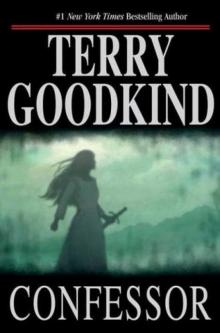 Confessor
Confessor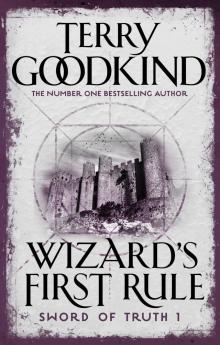 Wizard's First Rule
Wizard's First Rule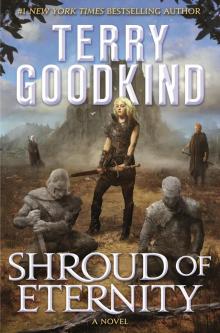 Shroud of Eternity
Shroud of Eternity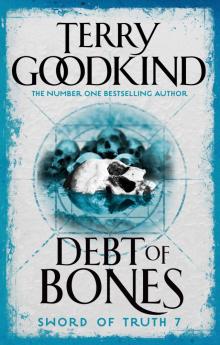 Debt of Bones
Debt of Bones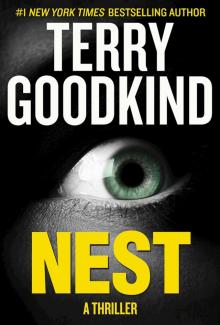 Nest
Nest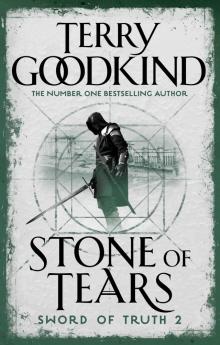 Stone of Tears
Stone of Tears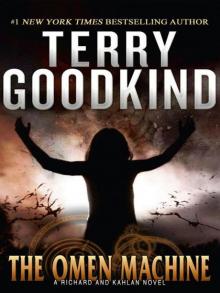 The Omen Machine
The Omen Machine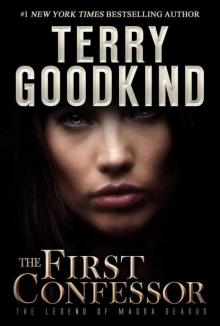 The First Confessor
The First Confessor Trouble's Child
Trouble's Child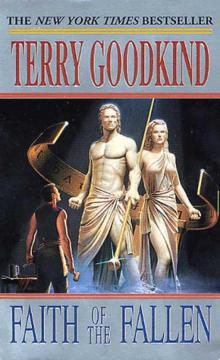 Faith of the Fallen
Faith of the Fallen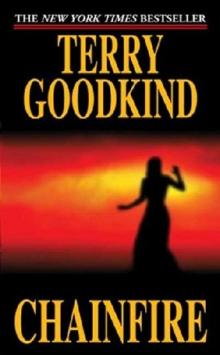 Chainfire
Chainfire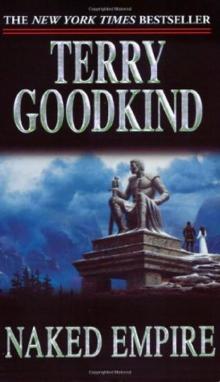 Naked Empire
Naked Empire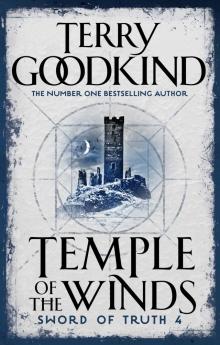 Temple of the Winds
Temple of the Winds Severed Souls
Severed Souls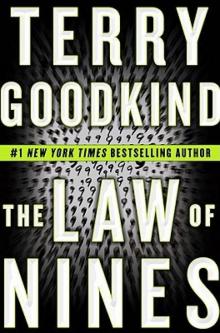 The Law of Nines
The Law of Nines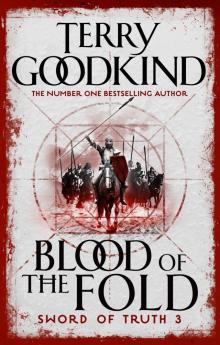 Blood of the Fold
Blood of the Fold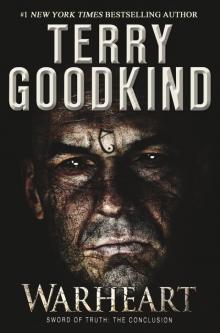 Warheart: Sword of Truth: The Conclusion
Warheart: Sword of Truth: The Conclusion The Sky People
The Sky People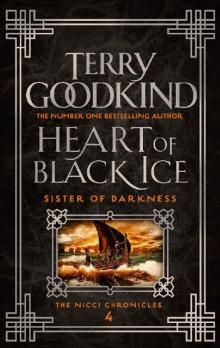 Heart of Black Ice (Sister of Darkness: The Nicci Chronicles Book 4)
Heart of Black Ice (Sister of Darkness: The Nicci Chronicles Book 4)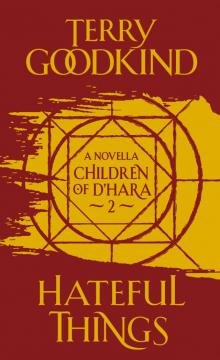 Hateful Things
Hateful Things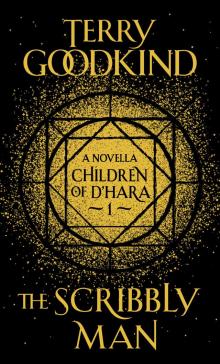 The Scribbly Man
The Scribbly Man The Pillars of Creation
The Pillars of Creation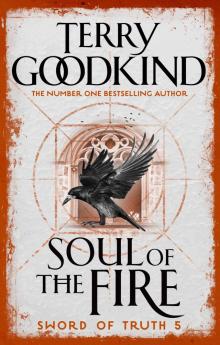 Soul of the Fire
Soul of the Fire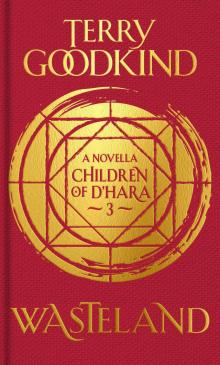 Wasteland
Wasteland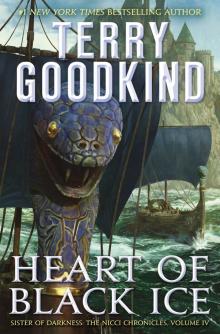 Heart of Black Ice
Heart of Black Ice Crazy Wanda
Crazy Wanda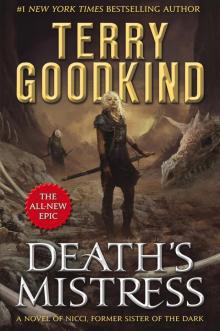 Death's Mistress
Death's Mistress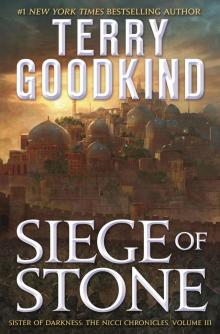 Siege of Stone
Siege of Stone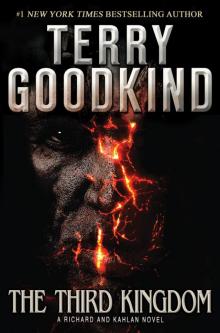 The Third Kingdom
The Third Kingdom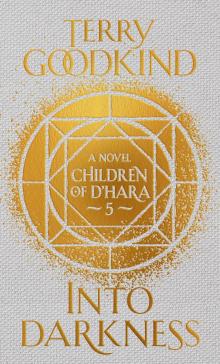 Into Darkness
Into Darkness The Girl in the Moon
The Girl in the Moon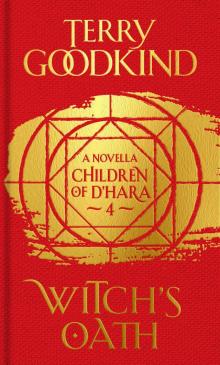 Witch's Oath
Witch's Oath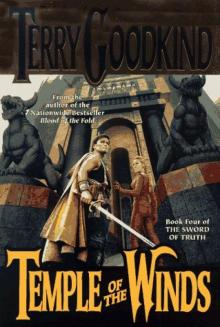 Temple of the Winds tsot-4
Temple of the Winds tsot-4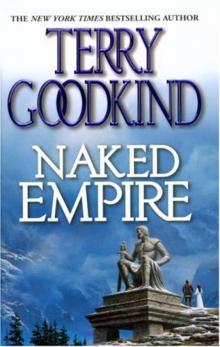 Naked Empire tsot-8
Naked Empire tsot-8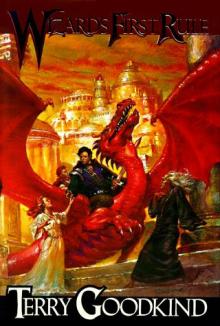 Wizard's First Rule tsot-1
Wizard's First Rule tsot-1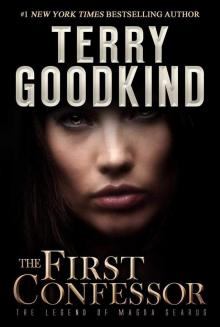 The First Confessor (The Legend of Magda Searus)
The First Confessor (The Legend of Magda Searus)![[Sword of Truth 9] - Chainfire Read online](http://i1.bookreadfree.com/i1/03/27/sword_of_truth_9_-_chainfire_preview.jpg) [Sword of Truth 9] - Chainfire
[Sword of Truth 9] - Chainfire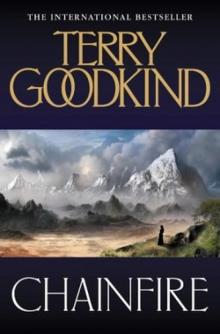 Chainfire: Chainfire Trilogy Part 1 tsot-9
Chainfire: Chainfire Trilogy Part 1 tsot-9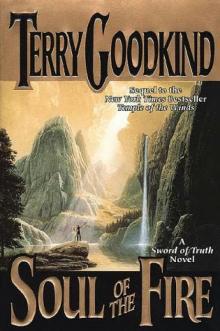 Soul of the Fire tsot-5
Soul of the Fire tsot-5 Pillars of Creation
Pillars of Creation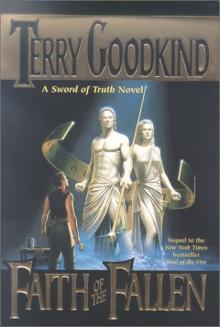 Faith of the Fallen tsot-6
Faith of the Fallen tsot-6 The Pillars of Creation tsot-7
The Pillars of Creation tsot-7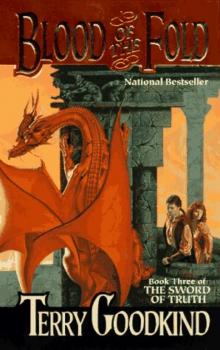 Blood of the Fold tsot-3
Blood of the Fold tsot-3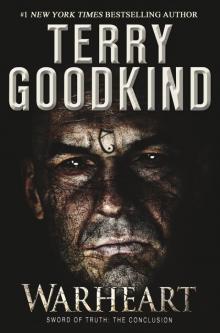 Warheart
Warheart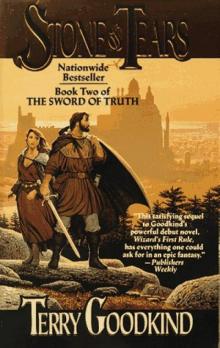 Stone of Tears tsot-2
Stone of Tears tsot-2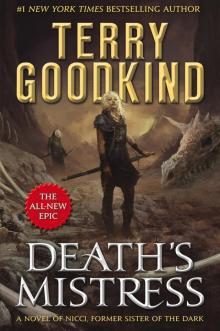 Death's Mistress--Sister of Darkness
Death's Mistress--Sister of Darkness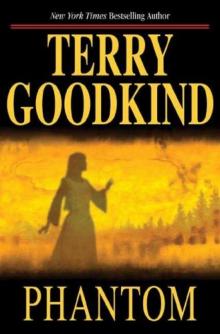 Phantom: Chainfire Trilogy Part 2 tsot-10
Phantom: Chainfire Trilogy Part 2 tsot-10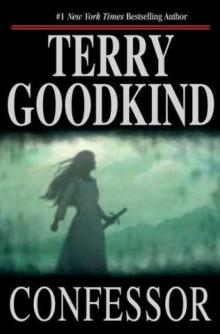 Confessor: Chainfire Trilogy Part 3 tsot-11
Confessor: Chainfire Trilogy Part 3 tsot-11